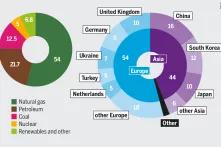
When Russia joined the Council of Europe in 1996, this was a major step and a sign of a fundamentally new time. The successor state to the Soviet Union joined a pan-European human rights regime that provided the citizens of its member states with effective judicial tools to defend their rights. Today, a good two decades later, Russia’s membership is in the balance. After the annexation of Crimea in 2014, the country saw its voting rights in the Parliamentary Assembly of the Council of Europe (PACE) suspended. In protest, Russia stopped the payment of part of its contribution to the organisation in June 2017. At the end of last year it further increased pressure, threatening to leave the organisation altogether if its voting rights are not restored. In turn, Ukraine, that lost control over a substantial part of its territory, has threatened that it would leave the Council of Europe if Russia’s voting rights were to be restored.
Russia and the Council of Europe
The Council of Europe was established in 1949, as a West-European organisation. It enlarged eastwards in the 1990s to include most former communist countries (with Belarus as an important exception), thus becoming a truly pan-European organisation. It now counts 47 member states, representing 820 million people. Based in Strasbourg it is an organisation dealing first and foremost with a wide array of human rights, as well as democracy and the rule of law. Furthermore it promotes European culture and runs projects on common European history. Through its European Convention on Human Rights and the binding jurisdiction of the European Court of Human Rights, it is the most developed regional human rights regime in the world.
As a member of the Council of Europe, Russia has a mixed record. It acceded to the organisation in 1996, backed up by a broad national consensus and despite a rather awkward timing around the end of the first Chechnyan war. Its membership was part of Russia’s reinvention as a post-communist, liberal-democratic state, seeking to be accepted by the West as a ‘normal great power’. [1] It ratified the European Convention on Human Rights in 1998. This created considerable capacity for its citizens to take their case to the European Court of Human Rights, after exhaustion of national judicial means. Russia, together with Ukraine, Turkey and Moldova, has been one of the main drivers of the increasing number of cases among non-EU member states. [2] In 2014 Russia made up 16% of the cases at the European Court of Human Rights and a considerable part of the backlog. Yet, per capita, it is not the member state with the highest number of cases. [3] Russia was late in ratifying Protocol 14 in 2010, which was aimed at simplifying the Court’s procedure and to solve the huge backlog of cases, many of which Russian.
When it comes to the implementation of the European Court of Human Rights rulings, Russia has for a long time been quite diligent in paying (smaller) compensations to victims. Yet, it has often failed to make the necessary domestic legal changes to comply with the Court’s judgements. It should be stated, however, that this is not an exclusively Russian problem. Also the UK, for example, has been criticised for a weak implementation of European Court of Human Rights rulings. The British government even suggested recently that the UK might leave the European Convention on Human Rights system altogether. [4]
A major change came with the Yukos case, when Russia was condemned to paying 1.9 billion EUR in damages, but refused to pay in 2017. This new course was justified on the basis of an amendment by the Duma to the Constitution of the Russian Federation, allowing Russia’s Constitutional Court to decide not to implement the ruling of international human rights courts if considered unconstitutional. [5] This was heavily criticised by the Council of Europe’s ‘Venice Commission’, which found this incompatible with Russia’s obligations under the European Human Rights Convention (notably article 46). Furthermore, the capacity of Russian citizens to take their case to court has been weakened by the increasingly difficult circumstances in which human rights NGOs are operating.
A classic dilemma
Moscow’s threat to leave the Council of Europe if its voting rights are not restored, represents a classic dilemma of how to deal ‘normally’ with Russia in ‘abnormal’ circumstances. On the one side, giving in to Russian pressure would mean the lifting of sanctions in the Council of Europe and create a precedent. Making concessions is regarded by many Western diplomats as implicitly legitimising the annexation of Crimea and reinforcing Moscow’s bargaining position in a context where the war in Eastern Ukraine rages on and tangible progress on the implementation of the Minsk II deal is lacking. Moreover, concessions could incentivise the Kremlin to push forward other demands.
On the other side of the dilemma, seeing Russia leave the organisation would have major consequences. Council of Europe membership is about the only thing that anchors Russia firmly into a pan-European human rights regime of 47 states. This is in the first place important for its citizens. It gives them the chance to defend their human rights at the European Court of Human Rights, after exhaustion of national judicial means. Even if Russia’s compliance with the rulings of the Court has been all but perfect, this continues to be an important instrument. First, as long as Moscow is formally committed to the European Convention on Human Rights, the latter remains a powerful instrument in the hands of critics to confront the Kremlin with the gap between its legal obligations and the actual state of human rights – in the same way as dissidents in the former Soviet Union used the 1975 Helsinki Final Act to expose the regime’s lack of respect for human rights. Secondly, Russia’s participation in the most important human rights regime is of great symbolic importance. Even in cases of weak compliance, rulings of the European Court of Human Rights may delegitimise government actions and reinforce those of the opposition. A clear case was that of Aleksei Navalny. The Court ruled that his conviction for fraud had been ‘arbitrary and manifestly unreasonable’ and ordered Russia to pay compensation. The ruling did not prevent a ban on Navalny’s participation in the presidential elections of 18 March 2018. Yet, it was an important delegitimation of the government’s actions against him and drew wide international media attention. Similarly, Russia was convicted over its 2013 law against ‘propagating’ homosexuality to minors. Furthermore, due to its accession to the Council of Europe, Russia has respected a ban on the death penalty. It has not ratified protocol 6 to the European Convention on Human Rights on the unconditional abolition of the death penalty in peace time but it has firmly respected a moratorium on the death penalty and not convicted any person since 1996. The moratorium has been formally established by the Russian Constitutional Court in 1999 and reconfirmed in 2009. This implies Russia is living up to the spirit of the protocol.
It would thus be unjustified to conclude that Russia’s membership of the Council of Europe does not matter. If Russia leaves, this will take away a tool for its more than 140 million citizens to defend their human rights and will decrease the attention for violations. It would thus harm Russian citizens rather than its elites. Besides, this would imply that Russia leaves one of the two main pan-European organisations – the other one being the Organisation for Security and Cooperation in Europe (OSCE). It would mean a further weakening of the already scarce pan-European organisations, a reinforcement of segregation and polarisation in Europe, and thus one more step towards the formation of blocs with their own organisations and their own rules to adhere to.
A way out?
Russia has been using disagreements over its membership of the Council of Europe to expose what it perceives as the ‘politicisation of human rights’. Russia’s Permanent Representative to the Council of Europe, Soltanovsky stated: ‘The protection of human rights is no longer perceived as a supreme value and the basis of this organization, but only as a populist tool to combat geopolitical rivals.’ He claims that the scandalous ‘politicization of human rights’ has taken ‘a systemic character’.
The rhetoric Russia is following is about the need of depoliticisation. Foreign Minister Lavrov stated: ‘We consider it important that representatives of parliaments of all the Council of Europe’s member states without exception can work on an equal footing without being subjected to any kind of persecution for dissent.’ [6]
It is far from certain Russia will put its threat to leave the Council of Europe into practice. Despite the sour rhetoric, there are still serious reputational costs when leaving this major pan-European organisation. Moreover, the Council of Europe is not just about human rights, but is also about other and broader forms of cooperation. Russia would likely lose influence and increase its isolation. To give but one example, Kosovo has announced its plan to submit an application for membership of the Council of Europe in 2018. Within the organisation Russia can weigh on this decision. Once it leaves, it gives up this potential leverage.
It seems that, rather than pushing to leave the organisation altogether, Moscow is using the current dialogue over the reform of the Parliamentary Assembly of the Council of Europe (PACE) rules to obtain a clause on non-discrimination of national parliamentary delegations. In this way, Russia hopes to regain its voting rights in the Assembly. It is also pursuing a dialogue with Danish Foreign Minister Anders Samuelsen, Chair of the Committee of Ministers of the Council of Europe, with this purpose.
Conclusion
Inevitably Russian pressure and the political impossibility to give in to it, reinforce the logic of competition and zero-sum thinking which have come to rule relations between Russia and the Euro-Atlantic community. Yet, with a Russia outside pan-European structures, finding long term solutions for today’s structural crisis is doomed to be even harder. No doubt an elegant solution for the Council of Europe dilemma is all but evident, but it is important not to lose sight of the longer term implications of a Russian withdrawal from the organisation: the further tightening of dividing lines within Europe as well as a substantial weakening of the protection of the human rights of Russian citizens.
[1] Andrei Tsygankov, Vladimir Putin’s vision of Russia as a normal great power. Post-Soviet Affairs, 21 (2005), 132-158.
[2] Petra Guasti, The EU and Russia in the Pan-European Human Rights Regime. In EU-Russia Relations in Crisis. Understanding Diverging Perceptions. Edited by Tom Casier and Joan DeBardeleben, 178-198. London: Routledge, 2018.
[3] Ibid.
[4] Merris Amos, The value of the European Court of Human Rights to the United Kingdom. European Journal of International Law, 28 (2017), 3, 736-785.
[5] Petra Guasti, op. cit.
[6] Foreign Minister Sergey Lavrov’s remarks at a joint news conference following talks with Chair of the Council of Europe Committee of Ministers and Foreign Minister of Denmark Anders Samuelsen, Moscow, February 6, 2018, https://Council of Europe.mid.ru/en_GB/-/vystuplenie-ministra-inostrannyh-del-rossii-s-v-lavrova-v-hode-sovmestnoj-press-konferencii-po-itogam-peregovorov-s-predsedatelem-kmse-ministrom-inost?inheritRedirect=true&redirect=%2Fen_GB

